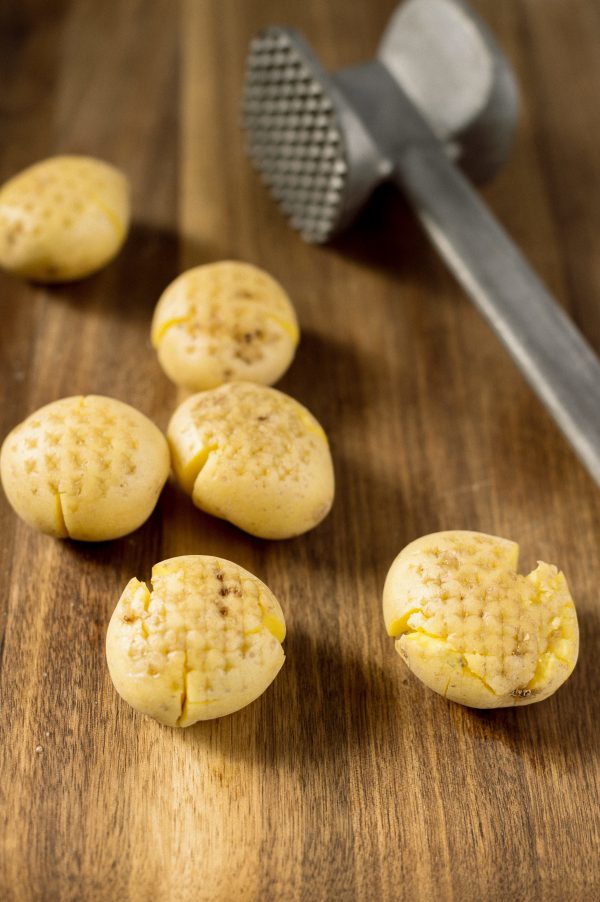Turning out flavorful potatoes with crackling skins and tender insides calls for too much of the things we try to avoid—time, effort and fat.
Even one of our favorites—crispy smashed potatoes—is a bother. First you must boil, then you flatten, then you crisp in fat. And half the time our potatoes fall apart.
We wanted a one-stroke solution that delivered the same results. Our first clue came from potatoes afelia, a Cypriot dish that calls for cracking the potatoes when raw, then braising them. We’d never considered flattening the potatoes prior to cooking. And we loved the idea that the seasonings would have the entire cooking time—not just the final fry—to penetrate and cling to the rough surfaces those cracks created.
Most afelia recipes—including that of London chefs Sam and Sam Clark—brown the potatoes, then finish them in red wine. Their recipe was our starting point.
The Clarks whack raw potatoes, splitting and fracturing them slightly but not enough to fall apart. Next, they cook the potatoes in a covered pan with oil and coriander seeds, a traditional afelia flavoring. A glass of red wine, added just at the end, simmers into a flavorful sauce.
During experiments at Milk Street, we tested the best ways to crack the potatoes. Hit too hard and they break; too gently and they’re merely dented. A firm, controlled hit with a meat mallet split the potatoes nicely but left them intact.
Large quantities of oil made the potatoes greasy, so we scaled down the amount used in the Clarks’ recipe from 10 tablespoons to just 2.
While we enjoyed red wine versions of the recipe, we preferred dry vermouth for both practical and flavoring reasons. We hate opening a bottle of wine just for cooking, and we almost always have an open bottle of vermouth (which, because it is fortified, lasts longer than conventional wine). And in our experience, even a low-cost vermouth adds better flavor—herbal notes and warmth—to a dish than inexpensive or old wine.
Though traditional afelia recipes add enough red wine to create a sauce, we found we liked the potatoes best when most of the liquid simmered off, leaving just its flavor behind. One cup of vermouth gave the best results for creamy, well-browned potatoes.

Slicing creates smooth, even surfaces on foods. Cracking, tearing, smashing and other rough treatments create uneven, porous surfaces. This helps other, more flavorful ingredients penetrate and cling to produce, like potatoes and cucumbers.
Related Recipes
March-April 2017

Sign up to receive texts
Successfully signed up to receive texts!
We'll only send our very best offers - Like a $15 store credit to start.
By entering your phone number and submitting this form, you consent to receive marketing text messages (such as promotion codes and cart reminders) from Christopher Kimball's Milk Street at the number provided, including messages sent by autodialer. Consent is not a condition of any purchase. Message and data rates may apply. Message frequency varies. You can unsubscribe at any time by replying STOP or clicking the unsubscribe link (where available) in one of our messages. View our Privacy Policy and Terms of Service.



